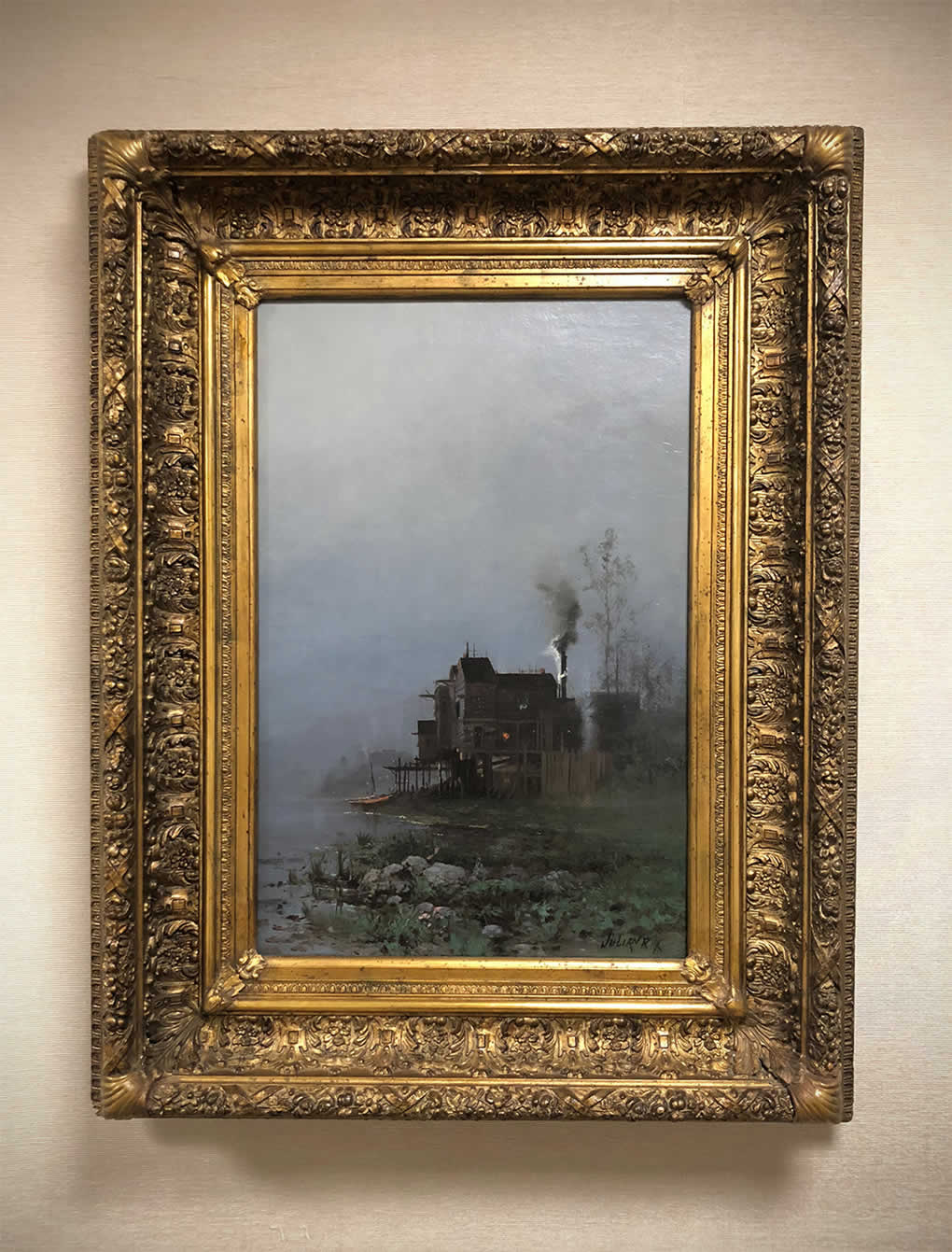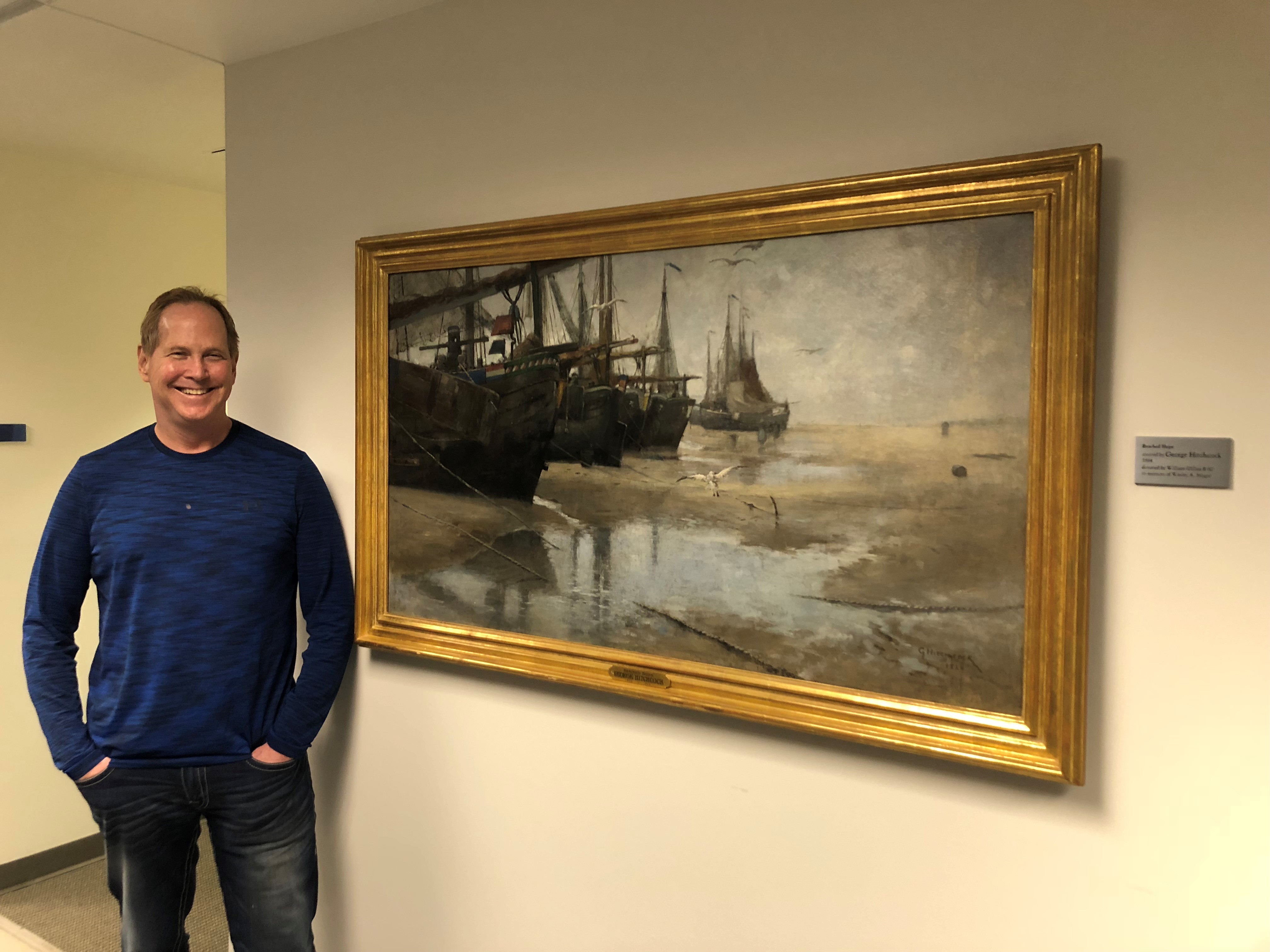The Art of Giving
When it comes to supporting Fuqua, there are many different paths one can take. Bill Gillies, a graduate of Fuqua’s Daytime MBA class of 1980 and member of the Thomas F. Keller Leadership Donor Society and the Rex D. Adams Society, supports the school in the way most meaningful to him: By donating art from his personal collection. The first piece, a painting by the name of “Beached Ships” by George Hitchcock, has hung in Fuqua’s Magat Center since 2017, given in memory of Wes Magat himself. A second painting, “Misty Camp” by Julian Rix, now also adorns the halls of Fuqua for all to enjoy.
Bill Gillies has always loved art—so much so that while some might use the very first bonus of their career for more traditional items, Bill purchased an oriental rug. “It was almost too big for the 500 square-foot flat I had at 81st and 1st,” Bill said. “My love of art may have come from loving what I didn’t have. I’m the oldest of four kids, and while my mom painted, my dad was a fireman. Back when I was young, I wanted to be an archaeologist. I was really into Greek mythology at a young age, and I think that romanticism of ancient history is why I have a bug for travel.”
Bill's own history is a part of his art collection through the gathering of family keepsakes and documents. “I was born in France because my dad was in the service, but I’m from Philadelphia, and some of my family is still in that area,” Bill said. Over the years many vacationers came to the northeast during the summer, and as such the family businesses flourished. Among his mementos is an 1898 bill of sale from a family fish store that shows 50 cents for 50 oysters. “My family also had a moving company, and I have an uncle who was very involved with The Peregrine Fund; we’re a pretty eclectic group.”

Bill's football scholarship at Lafayette College soon had him playing club rugby at Duke with business school friends. “I have plenty of fun stories from my time on campus; one of them involves being chased around West Campus in my old VW Bug. Let’s just say Duke has gotten a lot more intellectual,” Bill laughed.
His choice between business schools decision came down to Fuqua or Cornell. “I really didn’t know too much about each one. So, admittedly being a bit superficial, I asked to see more of their promotional materials.” Bill opened up Cornell’s catalog and saw a familiar sight: People bundled up and making their way through piles of snow. “I then opened up Duke’s catalog and they were playing frisbee on the quad with dogs. I’d never even been down to campus, but I packed up my Bug and headed south!”
While at Duke, Bill became a teaching assistant for Wes Magat, former Fuqua faculty member and a founder of Fuqua’s Global Executive MBA program. “To put it simply, Wes was a class act and such a giving individual. Whenever I came back to campus, he was the one that sincerely asked, ‘Bill, what are you doing?’ I have always wanted to give something to the school in his name.” Today, the exhibit of paying his positive experiences forward proudly hangs in the western halls of Fuqua for the community to enjoy.

Also a member of the Isle Maligne Society, Bill has been a steadfast supporter of Fuqua. “I give because I loved my time at Fuqua. It opened doors for me that were previously closed. Coming to Fuqua is what got me to Merrill, and now I’ve hired Duke people at Merrill Lynch as a recruiter, so we’ve sort of come full circle.”
Bill's work and personal travels have taken him to over 78 countries, including African safaris, Kilimanjaro climbs, and authentic mummy encounters in Cairo. “In my last position at Merrill I was in charge of marketing for U.S. government agencies, so that’s where I spent some time in Asia, Hong Kong, Singapore, and Tokyo. You can get really immersed. You’re just not thinking about answering e-mails or calling clients. You’re just there absorbing all the beauty.”
As for Bill’s love of art and the pieces that are in his own home, their presence is more akin to a gathering of friends sharing stories than simple decorations. “It’s all about the connection. It’s better to buy the best work from an artist you love and can afford than to purchase the worst of a well-regarded artist. You see this happen in auctions all the time—‘buying a signature’ rather than buying the piece itself.”

The two paintings that brighten Fuqua’s halls are not only tokens of Bill’s adventures, but now also represent his appreciation for the school and the individuals that shaped his life-changing education. For students observing them today, they are symbols of a fellow Fuquan's intent to pay that experience forward. “Money’s not permanent, and for me it’s about more of an emotional connection. I’ve lived with these paintings for at least twenty years, and when I see those pieces, they’re memories from periods and places of my life. They’re a part of me, and when you give something you love, there's a permanence to it.”
Learn how you can make an impact by supporting Fuqua, or read more about different ways to give here.
